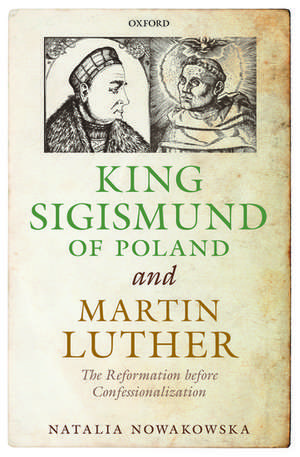King Sigismund of Poland and Martin Luther: The Reformation before Confessionalization
Autor Natalia Nowakowskaen Limba Engleză Hardback – 11 ian 2018
| Toate formatele și edițiile | Preț | Express |
|---|---|---|
| Paperback (1) | 168.06 lei 10-16 zile | |
| OUP OXFORD – 15 iun 2023 | 168.06 lei 10-16 zile | |
| Hardback (1) | 629.24 lei 31-37 zile | |
| OUP OXFORD – 11 ian 2018 | 629.24 lei 31-37 zile |
Preț: 629.24 lei
Preț vechi: 842.54 lei
-25% Nou
Puncte Express: 944
Preț estimativ în valută:
120.43€ • 125.39$ • 101.77£
120.43€ • 125.39$ • 101.77£
Carte tipărită la comandă
Livrare economică 27 februarie-05 martie
Preluare comenzi: 021 569.72.76
Specificații
ISBN-13: 9780198813453
ISBN-10: 0198813457
Pagini: 294
Ilustrații: 6 black and white figures/illustrations
Dimensiuni: 164 x 243 x 26 mm
Greutate: 0.61 kg
Editura: OUP OXFORD
Colecția OUP Oxford
Locul publicării:Oxford, United Kingdom
ISBN-10: 0198813457
Pagini: 294
Ilustrații: 6 black and white figures/illustrations
Dimensiuni: 164 x 243 x 26 mm
Greutate: 0.61 kg
Editura: OUP OXFORD
Colecția OUP Oxford
Locul publicării:Oxford, United Kingdom
Recenzii
a truly path-breaking work. It is based on a command of a large primary and secondary printed and manuscript literature. It will be a must read for specialists in the history of the early modern Commonwealth, and, most welcome -- I can't stress this enough -- for important, serious scholars of the Reformation and the Counter-Reformation
With a wide range of sophisticated tools, including both the careful exploration of individual texts and a very insightful discursive analysis of a whole corpus of sixteenth century documents, Nowakowska has transformed our understanding of the Reformation in Eastern Europe (and beyond).
Natalia Nowakowska's book reshapes fundamental historical paradigms about the geographic parameters of the Protestant Reformation and the chronology of the Reformation in Poland ... In her marvelously vivid account of Lutheran political movements on Polish territory, Nowakowska captures the complexity of early sixteenth-century church-state relations and fluidly integrates the religious history of the Polish Republic into wider European trends, portraying it as a key example of how Protestantism dramatically ruptured worldviews across the continent.
This monograph by Natalia Nowakowska fills an important gap in the research on the Reformation in Poland. This excellent study will serve as a credible interpretation and a handbook not only for students, but also for the broader public
[an] excellent monograph ... [it] makes important contributions to the history of religious toleration, Reformation scholarship and research on Central Europe more broadly. It introduces a new way of thinking about toleration in the first half of the sixteenth century
Nowakowska's research now provides a detailed case study tracing how this played out in the lands of the Polish monarchy. It further convincingly pinpoints the fundamental shift, not merely to a narrowing down of options, but to the changing discourse about doctrine initiated by Luther ... The implications of the hypothesis are far-reaching ... This book shows how important the study of Central and Eastern Europe is to the history of the Reformation. As the first monograph on the subject for over a century it brings the Polish material back into view and into contact with the core scholarship. On a higher level it prompts us to think not only about the catalysts for historical change, but also about how people lived through, experienced and recognized great historical changes as they happened.
With a wide range of sophisticated tools, including both the careful exploration of individual texts and a very insightful discursive analysis of a whole corpus of sixteenth century documents, Nowakowska has transformed our understanding of the Reformation in Eastern Europe (and beyond).
Natalia Nowakowska's book reshapes fundamental historical paradigms about the geographic parameters of the Protestant Reformation and the chronology of the Reformation in Poland ... In her marvelously vivid account of Lutheran political movements on Polish territory, Nowakowska captures the complexity of early sixteenth-century church-state relations and fluidly integrates the religious history of the Polish Republic into wider European trends, portraying it as a key example of how Protestantism dramatically ruptured worldviews across the continent.
This monograph by Natalia Nowakowska fills an important gap in the research on the Reformation in Poland. This excellent study will serve as a credible interpretation and a handbook not only for students, but also for the broader public
[an] excellent monograph ... [it] makes important contributions to the history of religious toleration, Reformation scholarship and research on Central Europe more broadly. It introduces a new way of thinking about toleration in the first half of the sixteenth century
Nowakowska's research now provides a detailed case study tracing how this played out in the lands of the Polish monarchy. It further convincingly pinpoints the fundamental shift, not merely to a narrowing down of options, but to the changing discourse about doctrine initiated by Luther ... The implications of the hypothesis are far-reaching ... This book shows how important the study of Central and Eastern Europe is to the history of the Reformation. As the first monograph on the subject for over a century it brings the Polish material back into view and into contact with the core scholarship. On a higher level it prompts us to think not only about the catalysts for historical change, but also about how people lived through, experienced and recognized great historical changes as they happened.
Notă biografică
Natalia Nowakowska has been a Tutor and Fellow in Early Modern History at Somerville College, University of Oxford, since 2007. She read History at Oxford as an undergraduate, and went on to hold post-doctoral positions at King's College London and University College, Oxford (and to work briefly in social policy). She is the author of a prize-winning first book on late medieval Poland, recipient of a British Academy Mid-Career Fellowship, and is currently the Principal Investigator of a major five-year European-Research Council funded project entitled 'Jagiellonians: Dynasty, Memory & Identity in Central Europe'.
